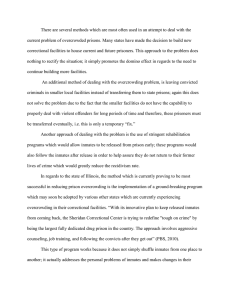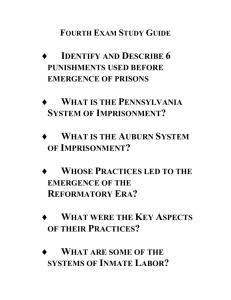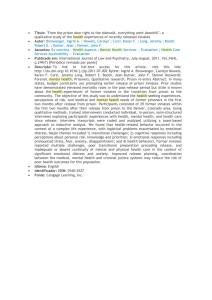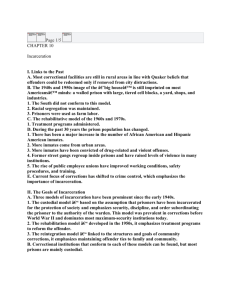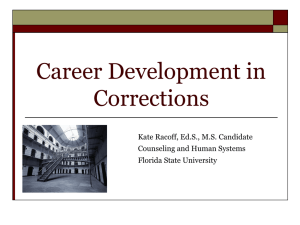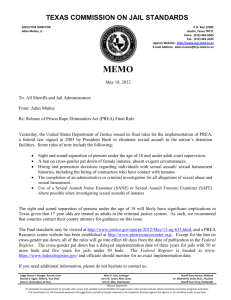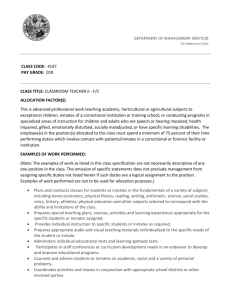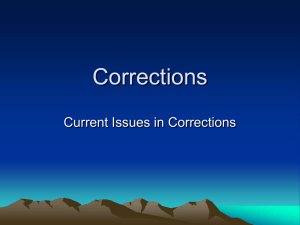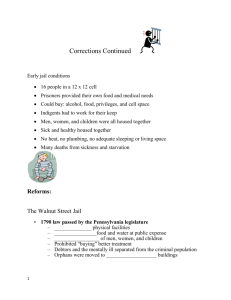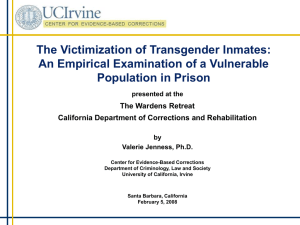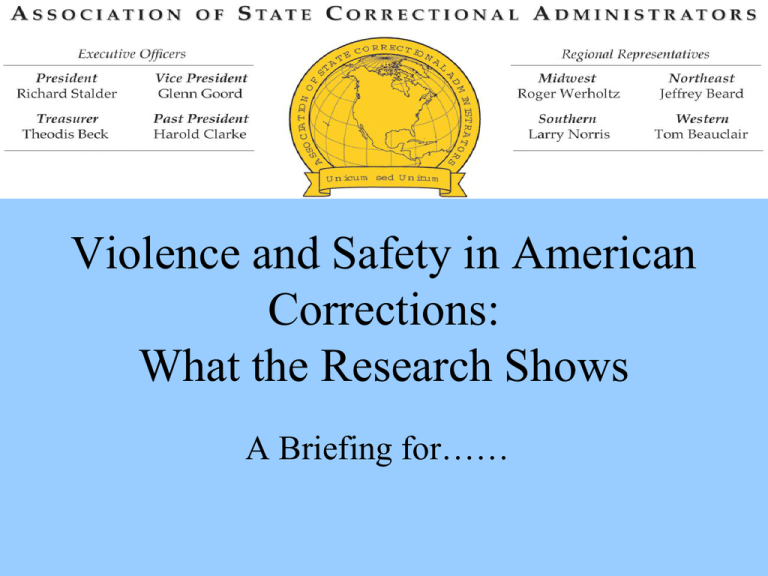
Violence and Safety in American
Corrections:
What the Research Shows
A Briefing for……
How do we measure safety in
Corrections?
• Follow principles of good social science
research (large, random samples).
• Gather data on a wide variety of
performance measures.
• Standardize the occurrence of violence by
population, to understand its relative
frequency/prevalence.
• Take into account the national trends that
affect prison populations and facility
operation.
Macro Trends in American Corrections
• Dramatic Population Increases fueled by
sentencing reforms and political environment.
• De-institutionalization of the mentally ill
resulting in Corrections becoming the primary
custodians.*
• The increasing power of Corrections Unions.
• National efforts to collect and share performance
data—thus boosting research capabilities.
• A National discussion on inmate reentry and its
implications for public safety.
What the Current Research Shows:
America’s Prisons and Jails are Safe and
Getting Safer.
• Over the last twenty-five years, the incarcerated
population has increased 330%.
• Over the same time period, a host of key
indicators of safety and order have improved
dramatically.
• The use of restrictive measures (like
administrative segregation) has also decreased.
• Thus, as several researchers have shown, these
gains are likely the result of correctional
leadership and innovative management.*
Population Growth
• The number of individuals incarcerated in the
United States has increased 330% from 1980 to
2004.
Homicide and Suicide
• Homicide and Suicide in Prisons and Jails occur
very infrequently and have declined dramatically,
even while the incarcerated population has exploded.
Prison Riots
Riots: The number and rate of prison riots has declined
dramatically from a peak in 1973 to a rare event in
recent years, despite the increase in prison population.
Staff Homicides: have declined 100%
from 1982 to 2001.
Prison Escapes: have declined 95%
from 1981 to 2001.
Inmate-on-Inmate assaults have
decreased 29% from 1984 to 2000
Incidents per 1,000
Inmates
Inmate Violations in State Correctional
Facilities, 1984-2000
Assaults on
Inmates per
1,000
Inmates
50
40
30
Assaults on
Staff per
1,000
Inmates
20
10
0
1984 1990 1995 2000
Year
Disturbances
and arsons
per 1,000
inmates
Assault and Sexual Assault (Cont’d)
• Assaults: In his testimony before the Prison
Commission, BJS statistician Allen Beck stated
that the likelihood of an individual inmates
experiencing assault is 7%.
• Sexual Assault: The recent BJS study on sexual
assault found 3.15 allegations of sexual violence
per 1,000 inmates held in 2004. In State prisons,
fewer than 20% of allegations of non-consensual
sexual acts were substantiated.*
Comparing Correctional Facilities and
the Community-At-Large:
Likelihood of In Prisons and Jails In Communities in The
experiencing: in the United States United States
Assault
7/100. (1)
2/100 (simple and
aggravated assault
combined) (2)
Sexual
Assault
1.16 incidents per
1,000 inmates. (3)
1 incident per 1,000
residents. (4)
The rate of inmates held in protective custody
has declined 69% from 1986 to 2001.
The use of administrative segregation has not
increased with population growth.
The percentage of inmates held in maximum
security facilities has decreased 30% from
1980-2004 (excludes federal prisons).
60
50
40
30
20
10
0
Maximum
security
19
74
19
79
19
84
19
90
19
95
20
00
Percentage
Percentages of Inmates at each
Security Level in State Correctional
Facilities, 1974-2000
Minimum
security
Medium
security
Year
What has happened in American Corrections
in the past 25 years?
• The incarcerated population has increased
dramatically.
• Homicides, suicides, riots, staff homicides and
prison escapes have all decreased dramatically.
• Available data indicates a decline in assaults;
assault and sexual assault are not considerably
higher in jail and prison than the community at
large.
• These gains have been achieved alongside a
decrease in the use of restrictive measures like
protective custody and administrative segregation.
What does this tell us?
• In conclusion, America’s prisons and
jails are safe and getting safer.
• Many factors contribute to safety and
effectiveness, including resources, staff
training, programming for inmates,
transparency and accountability.
• To achieve safety gains in this context,
high quality correctional leadership and
effective management are absolutely
essential.

